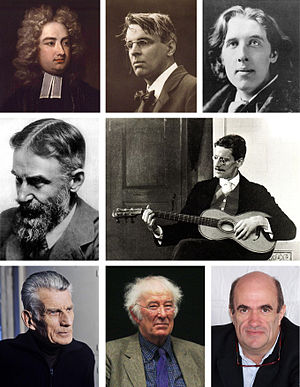Irish literature comprises writings in the Irish, Latin, Ulster Scots and English languages on the island of Ireland. For a comparatively small island, Ireland has made a disproportionately large contribution to world literature.[citation needed] The earliest recorded Irish writing dates from the seventh century and was produced by monks writing in both Latin and Early Irish. In addition to scriptural writing, the monks of Ireland recorded both poetry and mythological tales. There is a large surviving body of Irish mythological writing, including tales such as The T?in and Mad King Sweeny. During the medieval, period there was a strong Bardic culture,[citation needed] in which professional literati had high status as panegyrists, historians and poets.[citation needed]The English language was introduced to Ireland in the thirteenth century, following the Norman Conquest of Ireland. The Irish language, however, remained the dominant language of Irish literature down to the nineteenth century, despite a slow decline which began in the seventeenth century with the expansion of English power. The nineteenth century saw a sudden and rapid replacement of Irish by English in the greater part of the country. At the end of the century, however, cultural nationalism displayed a new energy, marked by the Gaelic Revival (which encouraged a modern literature in Irish) and more generally by the Irish Literary Revival.The Anglo-Irish literary tradition found its first great exponent in Jonathan Swift. Writers such as Lawrence Sterne, Oliver Goldsmith and Richard Brinsley Sheridan are often claimed for Ireland, though their lives and their works were essentially English. The same can be said of Oscar Wilde, Bram Stoker and C.S. Lewis, prominent writers who left Ireland to make a life in London. More recognizably "Irish" writers included Louis McNeice, George Bernard Shaw (though he spent most of his life in England) and W. B. Yeats. The descendants of Scottish settlers in Ulster formed the Ulster-Scots writing tradition, having an especially strong tradition of rhyming poetry.Though English was the dominant Irish literary language in the twentieth century, much work of high quality appeared in Irish. A pioneering modernist writer in Irish was P?draic ? Conaire, and traditional life was given vigorous expression in a series of autobiographies by native Irish speakers from the west coast, exemplified by the work of Tom?s ? Criomhthain and Peig Sayers. The outstanding modernist prose writer in Irish was M?irt?n ? Cadhain, and prominent poets included M?irt?n ? Dire?in, Se?n ? R?ord?in and M?ire Mhac an tSaoi. Prominent bilingual writers included Brendan Behan (who wrote poetry and a play in Irish) and Flann O'Brien. Two novels by O'Brien, At Swim Two Birds and The Third Policeman, are considered early examples of postmodern fiction, but he also wrote a satirical novel in Irish called An B?al Bocht (translated as The Poor Mouth). Liam O'Flaherty, who gained fame as a writer in English, also published a book of short stories in Irish (D?il).Most attention has been given to Irish writers who wrote in English and who were at the forefront of the modernist movement, notably James Joyce, whose novel Ulysses is considered one of the most influential of the century. The playwright Samuel Beckett, in addition to a large amount of prose fiction, wrote a number of important plays, including Waiting for Godot. Several Irish writers have excelled at short story writing, in particular Frank O?Connor and William Trevor. In the late twentieth century Irish poets, especially those from Northern Ireland, came to prominence with Derek Mahon, John Montague, Seamus Heaney and Paul Muldoon. Other notable Irish writers from the twentieth century include, poet Patrick Kavanagh, dramatists Tom Murphy and Brian Friel and novelists Edna O'Brien and John McGahern.Well-known Irish writers in English in the twenty-first century include Colum McCann, Anne Enright, Roddy Doyle, Sebastian Barry, Colm Toib?n and John Banville, all of whom have all won major awards. Younger writers include Kevin Barry, Emma Donoghue, Donal Ryan and dramatist Martin McDonagh. Writing in Irish has also continued to flourish.A total of four Irish writers have won the Nobel Prize for Literature ? W.B. Yeats, George Bernard Shaw, Samuel Beckett and Seamus Heaney. Modern literature in Irish continues to be vigorous.




Comment
0